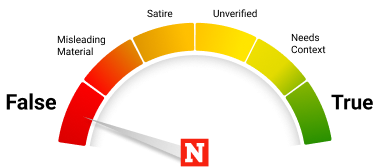Moscow reacted strongly to the supposed call by Ukrainian President Volodymyr Zelensky about how to deter Russia from using nuclear weapons in the war in Ukraine.
With the world on tenterhooks over whether Vladimir Putin might resort to non-conventional arms in Ukraine to turn around his faltering invasion, Zelensky described how "preventative strikes" were a disincentive for such atomic weapons.
Russian officials condemned the comments, with Kremlin spokesman Dmitry Peskov, telling RIA Novosti that they were "nothing more than a call to start a world war with unpredictable, monstrous consequences."

The Claim
Several prominent social media users accused the Ukrainian president of fanning "nuclear" rhetoric following his recent video address.
"Zelensky just asked NATO to start a Nuclear War with Russia. This is f***ing INSANE!" wrote prominent conspiracy theorist Kim Dotcom on Twitter.
"ZELENSKY: I didn't get approved for NATO Membership? Ok, then NATO should destroy the world in a nuclear Holocaust to prevent nuclear war," wrote Garland Nixon, a left-leaning DC-based talk show host.
The Facts
During a remote address to Australia's Lowy Institute on Thursday, Zelensky said NATO must make it impossible for Russia to use nuclear weapons in the war.
He was asked about whether he believed if the likelihood of the use of Russian nuclear weapons against Ukraine has risen, and what more NATO needed to do to deter Russia from using nuclear weapons.
Zelensky replied that NATO should "eliminate the possibility of Russia using nuclear weapons."
"But what is important, I once again appeal to the international community, as I did before February 24—we need preventative strikes, so that they'll know what will happen to them if they use nukes, and not the other way around," he said.
"Don't wait for Russia's nuclear strikes, and then say, 'Oh, since you did this, take that from us!' Reconsider the way you apply pressure. This is what NATO should do— reconsider the order in which it applies pressure [on Russia]."
It is also worth noting Ukrainian word "удар," which Zelensky used in the address, can mean a literal "strike," but also has figurative meanings, such as a "hit" or a "blow," a nuance that perhaps has gotten lost in the the simultaneous interpreting and the subsequent reporting.
The comments were promptly taken out of context and seized upon by Russian officials who have for a long time lambasted the West for its military support for Kyiv's forces.
Russian foreign ministry spokeswoman Maria Zakharova said on Telegram that it showed that the West was "fueling a nuclear war" and denounced Zelensky as a "monster" who is able to "destroy the planet."
Peskov also weighed in, saying the the U.S. the U.K. and the EU "should pay attention" to Zelensky's comment as they were "de facto" responsible for the statements from Kyiv.
However, Zelensky's spokesman Serhii Nykyforov, stepped in to clarify the president's remarks, saying he was referring to preventive sanctions that should have been applied to Russia before its full-scale invasion.
He said in a Facebook post that the "nuclear hysteria" had "gone a little too far," and that Zelensky had been speaking about action "in the period before February 24."
"Then it was necessary to apply preventative measures to prevent Russia from starting the war," he said according to a translation, referring to sanctions. He added that "to hint at the use of nuclear weapons is afforded only by the terrorist state Russia. You will never hear such calls from Ukraine."
Meanwhile, Ukrainian presidential adviser, Mykhailo Podolyak, said his boss was reminding the world of "Russian nuclear blackmail and offered the world to pre-emptively outline the consequences for Russia and intensify strikes against Russia."
These included "sanctions and armed aid."
It is unclear whether Moscow was deliberately misinterpreting Zelensky's comments to provide an excuse to accuse Kyiv and the West of escalation. Putin's announcement that Moscow had annexed four regions in Ukraine was in itself denounced as an escalatory move, and spurred speculation about whether he might resort to nuclear weapons to protect the oblasts (an administrative division or region in Russia and the former Soviet Union) he now claims as Russian.
Last month, Putin had warned that the Russian military would "use all the means at our disposal" in Ukraine to "protect Russia and our people" suggesting that the use of nuclear weapons was "not a bluff."
But Russian state media reports of Zelensky's comments have emphasized the Kremlin's official position that it "has no plans to use nuclear weapons."
"Putin emphasized that there can be no winners in a nuclear war. Russia's detractors should know that it has such weapons, but Moscow does not threaten anyone," RIA reported.
Newsweek has contacted Zelensky's office and the Russian Foreign Ministry for comment.
The Ruling

False.
The quote from Ukraine's president has been taken out of context and misrepresents his message.
As his spokesman clarified after his address, Zelensky's talk of "preemptive strikes" referred to measures such as sanctions before Putin launched his full-scale invasion on February 24.
Both the February 24 date and the phrase "apply pressure" (suggesting sanctions rather than a literal military strike) are used in his speech.
Zelensky's comment, which was not unprompted but came as a response to a question, was focussed on strategy, rather than being a threat.
As Nykyforov highlighted, the president outlined how the world had to take preventive measures to prevent Russia from starting a war, and at that time it was only about sanctions. Podolyak said Russia was pushing "fake" narrative that Zelensky was calling for nuclear war.
FACT CHECK BY NEWSWEEK
Uncommon Knowledge
Newsweek is committed to challenging conventional wisdom and finding connections in the search for common ground.
Newsweek is committed to challenging conventional wisdom and finding connections in the search for common ground.
About the writer
Brendan Cole is a Newsweek Senior News Reporter based in London, UK. His focus is Russia and Ukraine, in particular ... Read more





